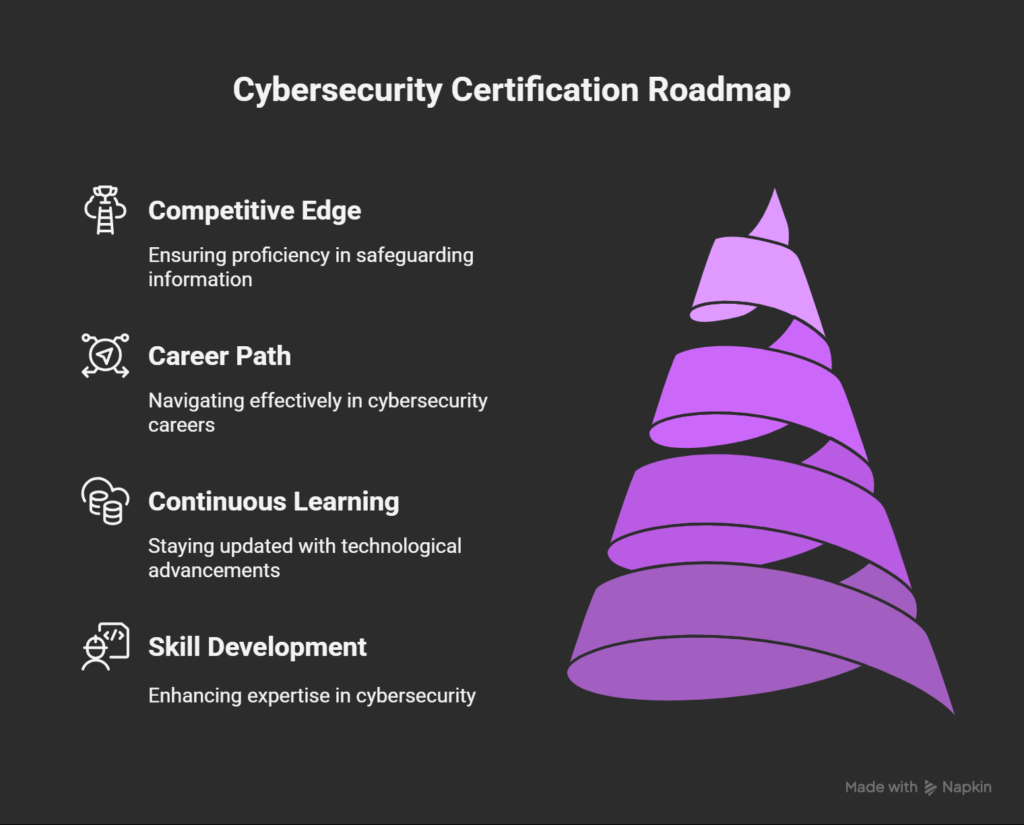The year 2025 is shaping up to be one of the most pivotal moments in the cybersecurity landscape. As organizations face an increasing number of sophisticated threats, the demand for highly trained professionals continues to grow. To stand out in this competitive market, individuals need a clear cybersecurity certification roadmap that guides their learning journey and ensures they are aligned with industry needs.
Why Certifications Matter in 2025
Cybersecurity is not a static field. Technologies evolve, attack methods become more complex, and global compliance standards shift rapidly. Certifications prove that a professional not only understands current challenges but can adapt to new ones. They serve as validation for employers who want assurance that their staff can safeguard networks, applications, and sensitive data.
Employers also use certifications as benchmarks when building security teams. For example, a financial institution may require SOC analysts to hold CySA+ or SC-200, while cloud providers often insist on AWS or Azure security certifications. This makes a well-planned roadmap critical for career mobility.
Starting with the Basics
Anyone beginning in cybersecurity must start with foundational certifications. These provide an overview of security principles, best practices, and risk management frameworks. In 2025, CompTIA Security+ (SY0-701) remains a top recommendation, as it equips candidates with knowledge in threat detection, encryption, and security operations. Another entry-level option, the Certified in Cybersecurity (CC) by ISC², is increasingly popular for those wanting global recognition.
For those seeking vendor-specific foundations, the Cisco CCNA 200-301 covers essential networking skills, which remain vital for all cybersecurity roles. Solid networking knowledge ensures professionals can identify how attacks move laterally across systems and how best to design secure infrastructure.
Climbing to Intermediate Certifications
Once the basics are in place, professionals often pursue certifications that demonstrate practical expertise. The Certified Ethical Hacker (CEH) remains a favorite among penetration testers, while CompTIA CySA+ is perfect for analysts monitoring threats. For cloud-focused careers, vendor-specific credentials like AWS Security Specialty and Google Cloud Security Engineer stand out as must-have certifications.
As hybrid cloud environments become standard, many professionals are combining multiple vendor certifications to prove they can secure multi-cloud infrastructures. For example, pairing AWS Security Specialty with Microsoft SC-200 signals strong cross-platform expertise, which employers increasingly value.
Advanced Credentials for Leaders
At the top of the roadmap are certifications that prove advanced knowledge and leadership ability. The Certified Information Systems Security Professional (CISSP) is still the gold standard for senior positions, while CISM (Certified Information Security Manager) is ideal for those aiming to oversee compliance and risk management programs. These certifications are not only about technical skills but also about aligning cybersecurity with business goals.
Other advanced options include the Certified Cloud Security Professional (CCSP) for those managing large-scale cloud environments, and the Offensive Security Certified Professional (OSCP) for penetration testers who want to demonstrate elite-level offensive security expertise. In fact, employers in critical infrastructure sectors are increasingly requiring OSCP-level skills to guard against advanced persistent threats (APTs).
Real-World Applications of the Roadmap
Consider an IT professional who starts in 2025 with CompTIA Security+. They might move into a SOC analyst role while preparing for CySA+. With experience, they transition into cloud security, earning the AWS Security Specialty. Over five to seven years, they progress toward CISSP or CCSP, eventually moving into a management role overseeing enterprise security strategy.
This roadmap demonstrates how certifications directly influence career trajectories. Each credential is not only a badge of honor but also a gateway to new job responsibilities, higher salaries, and leadership opportunities.
New Trends Reshaping the Roadmap
2025 brings unique shifts in the industry. The adoption of Zero Trust architecture, increased use of artificial intelligence in defense and attack scenarios, and heightened regulations around data privacy are creating demand for niche certifications. Those who pursue these emerging areas will stand out as forward-thinking professionals.
For example, AI-driven attacks are now capable of bypassing traditional security measures. Professionals with certifications focusing on AI-enabled defense strategies will be in high demand. Similarly, industries like healthcare and finance, under strict compliance rules, are pushing professionals to pursue certifications centered on privacy and governance frameworks.
Creating a Roadmap That Fits You
Not every cybersecurity career is identical. Someone interested in penetration testing will follow a different path than someone aiming to become a Chief Information Security Officer (CISO). The key is to select certifications that align with long-term career objectives rather than chasing every credential.
For penetration testers, the roadmap might progress from Security+ to CEH, then OSCP, and finally advanced bug bounty or red-team certifications. Meanwhile, someone aiming for management might follow Security+, then CISM, CISSP, and later privacy certifications like CDPSE. Resources like Cert Empire provide updated exam guides, dumps, and study plans to help professionals stay aligned with their chosen path.
Avoiding Common Mistakes
One of the biggest mistakes is pursuing certifications without real-world practice. Certifications validate skills, but employers expect candidates to also demonstrate practical knowledge. Setting up home labs, working on security projects, or contributing to open-source security tools can greatly boost employability. Another mistake is ignoring emerging certifications. Professionals who stay static risk being outdated, even if they hold prestigious credentials.
Career Outlook with a Roadmap in 2025
The global cybersecurity workforce gap continues to widen. Millions of jobs remain unfilled, and this shortage is unlikely to close anytime soon. Certified professionals with clear roadmaps enjoy not only higher salaries but also increased job security. Reports suggest that professionals with advanced certifications like CISSP earn significantly more than peers without them. Employers also increasingly prefer candidates who demonstrate structured career planning through logical certification pathways.
Over and Out
The Cybersecurity Certification Roadmap 2025 is not about collecting as many certifications as possible. It’s about building a structured pathway that matches your career ambitions, adapts to industry trends, and prepares you for the future. By combining foundational knowledge with specialized expertise, you can position yourself as a highly valuable professional in an increasingly digital and interconnected world.








Leave a Reply